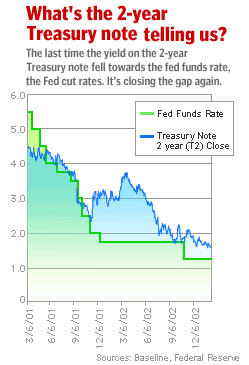NEW YORK (CNN/Money) -
On Friday Merrill Lynch became one of the first major Wall Street firms to predict that the Federal Reserve will cut short-term interest rates at its policy meeting scheduled for March 18.
Kathy Bostjancic, Merrill's trading desk economist, and David Rosenberg, chief North American economist, in a brief research note said the Labor Department's surprisingly ugly report on Friday of 308,000 losses in non-farm payrolls in February will spur central bank policy makers to action this month and again in May.

The economists said they expect the Fed to cut its target for the federal funds rate, the overnight lending rate banks use as the basis for prime rates, to 1.0 percent from 1.25 percent in March and to cut rates to 0.75 percent at its May 6 meeting.
That, Bostjancic and Rosenberg said, would probably be the lowest the fed funds rate would go.
"If further stimulus is needed, the Fed will start buying intermediate and long-term Treasury securities," they wrote.
Their note was immediately followed by a new Reuters poll that found 5 of 21 economists surveyed now expect a rate cut in March, while 14 of 21 expect the Fed to shift its "bias" statement to say it thinks the risks to the economy are weighted toward weakness.
Financial markets were also signaling traders' growing belief that a rate cut could be on the way. The federal funds futures contract for March was pricing in a 33 percent chance of a rate cut.
| Related stories
|

|
|
|
|
And the yield on two-year Treasury notes had fallen below 1.4 percent, a record low. The past few times the two-year yield has fallen to the Fed's target for its key interest rate, the Fed has cut rates.
Even before Friday's unemployment report, some economists had taken note of signs of real trouble in the U.S. economy and wondered if the Fed might not need to cut rates soon in order to lower borrowing costs and keep money flowing through the economy.
Fed Chairman Alan Greenspan has indicated he'd rather wait until the situation in Iraq is cleared up, saying he thought most of the economy's recent problems stemmed from geopolitical uncertainties and that a rebound could follow quickly after the Iraqi situation was resolved.
What's more, the Fed might be reluctant to use up so much of its policy ammunition so soon, preferring to hold some in reserve for big shocks to the economy.
But Friday's jobs report was a red-light indicator that, whether the weakness was driven by geopolitical uncertainty or not, it was doing real damage, which the Fed might have to try to repair.
The Fed cut rates 11 times in 2001 to fight the effects of a recession, and it cut again in 2002, when there were signs that the recovery was stalling.
Super-low rates on both short- and long-term debt have helped keep consumers spending -- especially on houses and cars -- despite the recession, job cuts, terror attacks and a host of other woes.
But some economists worry that there's not much more demand for cheap credit and that the government might have to step in with some kind of stimulus measure of its own.

|

